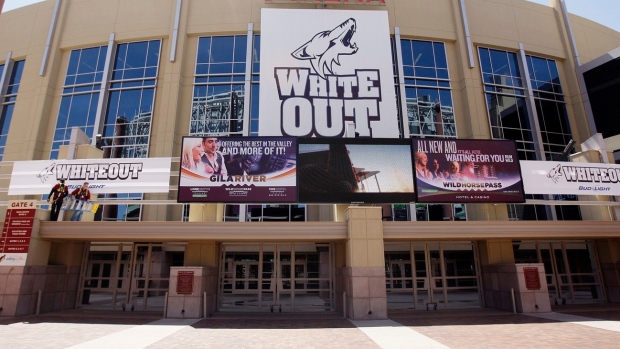Jun 19, 2015
Documents show Coyotes, Glendale have fought for months
The Arizona Coyotes and city of Glendale have been at odds over a controversial arena management contract since at least January, according to documents obtained by TSN. Emails between city staff and Coyotes executives document a contentious relationship over the past six months.

The Arizona Coyotes and city of Glendale have been at odds over a controversial arena management contract since at least January, according to documents obtained by TSN.
Emails between city staff and Coyotes executives document a contentious relationship over the past six months, during which time the Coyotes allegedly opposed the city’s move to hire professional sports executive Tony Tavares to oversee an audit of the NHL team, and bickered over whether the team was purposely delaying that audit.
The emails also reveal that the city has made Coyotes officials aware as early as March of their concerns that Coyotes lawyer Craig Tindall might inappropriately use information he obtained while previously working for the city to help the Coyotes.
"Tying the audit into the actions the city took last week appears to be a non sequitur," Coyotes spokesman Rich Nairn said.
The emails – which were among 307 pages of documents obtained by TSN through the U.S. Freedom of Information Act – contradict public statements made by the Coyotes last month. After several Glendale city councillors told TSN in interviews that they wanted to undo the arena contract – a deal in which the city pays the team $15 million per year – Coyotes part-owner Anthony LeBlanc scolded councillors for going to the media instead of raising their concerns privately. LeBlanc later said he was blindsided when Glendale city council scheduled a vote to terminate the contract.
But the documents show problems between the city and Coyotes dating to when Tavares signed a personal services agreement worth as much as $45,000 with Glendale.
In a Jan. 13, 2015, email to Tindall, Glendale city attorney Michael Bailey complained that the team was refusing to provide information it needed for the audit.
“The Arizona Coyotes need to make the information available for the audit,” Bailey wrote. “Anything less appears to be nothing more than a delay tactic. At this point in time, the continued delay is causing harm to the city.”
Tindall replied that the city’s hiring of Tavares was outside the scope of the team’s contract with the city, and that Tavares must sign a confidentiality agreement.
“What we need, however, and this has been clearly stated, is assurance that the confidentiality of the proprietary information being provided is contractual protected,” Tindall wrote. “Give us something that binds Tony contractually and we’re good. Look, he’s been in the business a very long time, he knows the importance of this, and he will be protective of the information.”
In a Feb. 20, 2015, email to Coyotes chief financial officer Gregg Olson, Glendale finance and technology director Tom Duensing wrote city officials were frustrated that the Coyotes were allegedly delaying providing information needed to conduct the audit.
“As you know, this is a high profile agreement, and the city has been very patient,” Duensing wrote. “However, not providing us with information that was requested many months ago is very concerning.
Gregg, we have done our best to work with you all and defend the fact that you have not provided information, but I am extremely frustrated and frankly do not understand your hesitation to work with us.”
Olson replied to Duensing in an email the same day, pointing out that the city had already changed terms of the planned audit by hiring Tavares.
“As you know, the city desired to vary the audit provisions of the agreement for last year’s audit,” Olson wrote. “The arena manager and team agreed to do that and made the arrangements necessary to accommodate the city’s request in a reasonable and proper manner. Much of the delay in doing so resulted from our waiting for the city’s responses, but we were patient through that process.
“At this time more than 90 per cent of the items listed on the city’s list are available for the city’s review… We are, as we have said repeatedly, happy to discuss with you or anyone else at the city this situation, or frankly any other situation, at any time. The city has rarely utilized this invitation.”
Documents also released under FOI legislation show city staff had worries about Coyotes lawyer Craig Tindall for months.
The city argues that it was legally entitled to end its arena management agreement with the Coyotes last week because Tindall allegedly helped to negotiate the contract while he was still being paid by the city. The lawyer was fired by Glendale in February 2013 and received six months’ worth of severance.
The arena management deal was signed July 2, 2013.
In a March 4, 2015, letter, city attorney Michael Bailey warned Tindall about revealing information to his Coyotes colleagues.
“As you know, during the course of your employment as Glendale’s city attorney, you served as the city’s legal advisor and a key member of the city’s negotiating team regarding hockey in Glendale,” Bailey wrote. “The city does not authorize you to disclose any information acquired by you in the course of your employment as the city attorney … The city believes that all information you received during the course of your employment, regarding the arena and any tenant of the arena and any owner of a National Hockey League franchise should not be disclosed.”
Glendale councillors say they still have not seen the Tavares audit. Vice Mayor Ian Hugh has said the team has cited a non disclosure agreement, preventing city auditors from sharing the audit of the Coyotes 2013-14 season with councillors.



